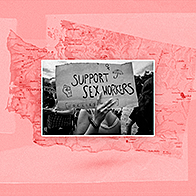Credit Card Companies Are Dictating Income for Adult Entertainers

The legal parameters of online adult media or digital sex work are defined by extremely blurry lines. Social media and user-generated content platforms have taken off in recent years, but how are they actually viewed in the eyes of the law?
"The interests of people who are engaged in online modeling, or in certain forms of online sex work, may, in some cases, parallel those of law enforcement or other interested groups because everybody benefits from clearer guidance," said Derek Bambauer, a professor of law at the University of Arizona in Tucson who specializes in areas of intellectual property, cybersecurity and online censorship.
He said banking institutions have too much unilateral control over rules concerning adult content and transactions online. Because the law hasn't kept up with the fervor of contemporary online activity, adult content creators and their audiences are at the whim of banks, credit card companies and the United States Treasury.
In between unclear rules and sudden and seemingly arbitrary barriers, Americans find themselves starving for ethical conduct and ethical adult business models.
Demystifying the hurdles to ethical porn through commerce
"I think the blurriest line of all is that line between fantasy and reality," said Lawrence A. Siegel, a clinical sexologist and educator based out of Boynton Beach, Florida. "What has occurred now is porn has become the de facto sex educator of our teens because they really have nothing else."
Siegel clarified there's nothing inherently wrong with sexualization in art and entertainment. Additionally, he said there's nothing wrong with porn, but certain repeated messages can eventually have an impact on a person's psyche.
The vast majority of porn and adult content isn't necessarily created with the concept of comprehensive sexual health and/or education in mind. Maybe this is partially due to a societal resistance against accepting porn as a mainstream form of entertainment, but that resistant mindset actually empowers large, corporate porn entities to take advantage of loopholes in the system. Ethical porn that prioritizes healthier portrayals of sex gets crushed underfoot by everything else.
Despite endless pornographic content that generates high revenue for those platforms and their partners, there are issues in the legal and financial systems that exist thanks to gray areas in the fiscal operations of adult content purveyors.
"When we're thinking about online regulation of content, one of the important things to keep in mind is the ability of what you might call nonlegal or extralegal levers or constraints," Bambauer said.
This refers to activity that ends up being regulated or managed from one angle or another without the authority or officiality of sanctioned branches of legal or justice systems.
Levers and constraints outside of the law
"So the thing that sort of popped immediately to my mind is Mastercard's new rules as a payment processor for sites that host or feature adult content," Bambauer said. "One of the reasons this matters is that having Mastercard stop processing payments for your site might actually be scarier than being prosecuted for something like obscenity because Mastercard doesn't really have any avenue of appeal, generally speaking, and your revenue being cut off might be fatal to a site."
Bambauer elaborated by saying there are a whole set of "moves that can be deployed" by what he called "clever regulators." Essentially, these are policies and/or practices that are not part of any specific law but still influence and guide the legal and justice systems.
"These extralegal provisions are not encoded in law anywhere," Bambauer added, "but they have just as much of an effect, if not more of an effect on the ecosystem...than the law that's on the books, so to speak."
An example he provided is the Federal Deposit Insurance Corporation (FDIC).
'Having Mastercard stop processing payments for your site might actually be scarier than being prosecuted for something like obscenity.'
"Various aspects of the Treasury Department oversee banks, and one of the ones that doesn't get much attention, even though they insure all of our checking and savings deposits, is the FDIC," Bambauer said. "Treasury maintains a set of informal guidelines about the types of accounts and the types of transactions that in its view are more likely to be suspicious and/or illicit than others. The mechanism by which you find your way onto that list is extremely opaque."
Under both the Obama and Trump administrations, adult sites were listed in the FDIC guidelines as more likely to process suspicious transactions. This meant banks had to take additional precautions with business and personal clients who had adult hustles in their history.
"So that means that, if you're somebody who has an OnlyFans channel or something, it might not just be that processing payments through a bank for your site is problematic, but you might not even be able to get a checking account," Bambauer continued.
These stipulations, which exist and adversely impact the lives of adult content creators, don't come from the voting population or from legislators looking out for the common good. Rather, they reflect the interests of transaction management companies and federal regulators of commerce and industry.
"This isn't any formal rule, it's not a law," Bambauer said. "It's just a wink and a nudge from the regulator that says if you are a bank that's engaged in this transaction, you're more likely to have the government looking over your shoulder than if you don't process that sort of transaction."
Adult content under pressure at every level
When OnlyFans announced it would no longer host adult content, the decision was met with an uproar of public discontent to which the company ultimately called a mulligan. Perhaps this represents a revolutionary conversation between consumer and corporation that more accurately portrays the public's long-oppressed thirst for easily accessible, independently produced adult content.
"According to OnlyFans, pressure was certainly coming from the financial side," Bambauer explained, noting that several banking institutions were raising questions about processing transactions for the site. He said the banks could have determined from a public relations perspective they did not want to be in the business of servicing OnlyFans, but this is unlikely due to the size and scope of the entities involved.
"I think it's much more likely that they [OnlyFans] are getting some pressure from banking regulators," he continued. "And then it's at least a possibility that both banks and OnlyFans are concerned about the impact of the changes under FOSTA and SESTA."
Bambauer clarified that these acts, signed into law in 2018 by former president Donald Trump, remove protections for companies that do business in a way that violates laws covered by the Fight Online Sex Trafficking Act and Stop Enabling Sex Traffickers Act.
"And there's always the possibility of secondary liability, right?" Bambauer added. "So if you are engaged in transactions, such as sex trafficking, and you have some reason to know that, then you as the bank can be might be liable. You could be fined. You could be prosecuted."
Sex trafficking is an undeniably tragic aspect of our modern world. And so far, laws designed to tackle this problem have inadvertently taken aim at online sex workers and adult content creators who may actually want to make an ethical and moral contribution to the world of adult content and services.
Clearer law with audience participation
"I think what we actually need in this area is more actual law and less soft law," Bambauer said. "With more actual law, there's the opportunity to challenge it. It has to go through an admittedly flawed but semi-democratic process."
It's easy to have a knee-jerk reaction to more laws governing sexuality. But, as Bambauer pointed out, laws exist already. It's no secret big companies and financial institutions have too much influence on business and are not subject to enough oversight in America.
But, we can continually push to normalize healthy, sexual content for pleasure, entertainment, education and catharsis. Companies and regulators can enact flawed policies because those policies are founded upon false perceptions about morality and decency, perceptions that only represent a minor and increasingly outdated portion of the population.
It's important to manage the knee-jerk reaction and recognize we need smart content regulation, which puts the well-being of creators and consumers first, with input from people who actually work in the world of adult content.




















